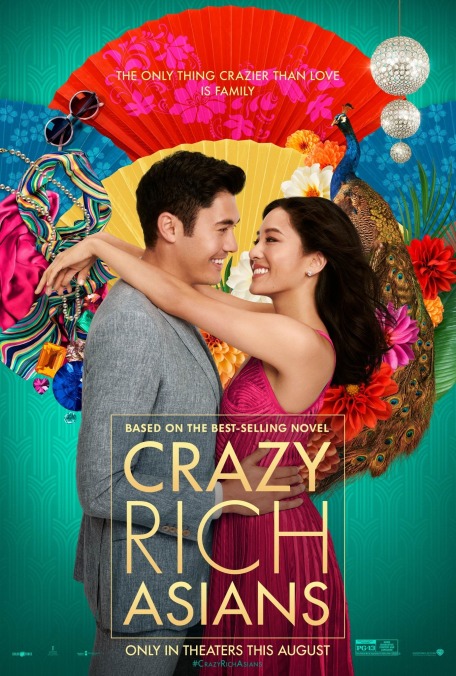Crazy Rich Asians has so much rom-com razzle dazzle it practically sings

Crazy Rich Asians isn’t a musical, but it feels like one. Frequent dance-movie director Jon M. Chu, who made a couple of the Step Up sequels, films the opulent world of Singaporean elite as if they might break out in song at any moment. A zippy montage of social media gossip feels like a modern update on Bye Bye Birdie’s “Telephone Hour.” Beauty And The Beast’s “Be Our Guest” could easily underscore any of the film’s many montages of delectable-looking Chinese cuisine. And there’s a wedding sequence so elaborately staged you could place it wholesale into a Broadway show. Chu’s film revels in the glamorous attire, kooky supporting characters, and elaborate parties that so often define the movie musical genre. And like the best musicals, Crazy Rich Asians joyously embraces a heightened aesthetic while keeping its story grounded in real emotional truth.
Constance Wu stars as Rachel Chu, a practical NYU economics professor who’s shocked to learn that the man she’s been dating for the past year is basically Singaporean royalty. Hunky boyfriend Nick Young (Henry Golding) isn’t just rich; he’s the 1 percent of the 1 percent. And since he’s set to inherit the family’s real estate empire and expected to marry the right sort of woman to sit by his side, there’s a metric ton of pressure on Rachel’s shoulders when she joins Nick in Singapore for his best friend’s wedding and meets his family for the first time. Nick’s intimidating mother, Eleanor (Michelle Yeoh), immediately disapproves of her son’s choice. And Rachel—who was raised in the U.S. by a hard-working Chinese immigrant single-mom—is treated to a crash course in cultural differences, not just between the rich and the middle class, but also between Asian and Asian-American cultures.
There’s a version of this film that holds Nick more accountable for thrusting Rachel into an overwhelming world without much in the way of guidance. Crazy Rich Asians doesn’t take that route. Instead, Nick remains a dashing Prince Charming (Golding more than fits the bill), and the threats to his relationship with Rachel are external rather than internal. There are plenty of heartwarming, tearjerking romantic moments to keep rom-com fans happy, but Crazy Rich Asians is first and foremost the story of Rachel struggling against the complex dynamics of Nick’s insular family. It’s also a surprisingly thoughtful meditation on wealth and womanhood. Those looking for even the smallest amount of capitalist critique have come to the wrong film, but Crazy Rich Asians does provide an empathetic exploration of the ways in which wealth can become a glamorous prison for women who are granted a life of luxury but not necessarily the same expectation of independence as their husbands.
Based on Kevin Kwan’s 2013 bestseller of the same name (the first in a trilogy of novels about Nick and Rachel), Crazy Rich Asians features a massive ensemble crammed full of over-the-top supporting characters who likely resonated a bit more on the page than they do on screen. Those who do make an impression include Astrid (Gemma Chan), Nick’s glamorous cousin whose statuesque figure belies her massive heart; Oliver (Nico Santos), the “rainbow sheep” of Nick’s family, who serves as a fairy godfather in Rachel’s Cinderella story; and Peik Lin (Awkwafina), Rachel’s oddball college bestie whose own considerable Singapore-based wealth would be impressive if it weren’t so dwarfed by Nick’s.
Though Golding gets plenty of screentime (much of it spent shirtless), it’s the film’s female cast who really shine. Following her breakout role on ABC’s Fresh Off The Boat, Wu gets the chance to stretch her acting wings in an entirely different direction. She makes the perfect rom-com everywoman—one of the best the genre has had in a while, in fact—and the film makes great use of both her wry comedic timing and her expressiveness. Ocean’s 8 pickpocket Awkwafina just about steals the movie in its most overtly comedic role. And though Chan is stuck in a subplot that feels somewhat tangential, her storyline remains compelling solely because of her ethereal performance. The film’s true standout, however, is Yeoh, who makes the perfect sparring partner for Wu. Yeoh fought to ensure Eleanor wouldn’t just be a tiger mom stereotype, and Malaysian-born TV writer Adele Lim was brought on to add more emotional authenticity to Peter Chiarelli’s initial script. That’s a huge boon for the whole movie (Rachel and her mom get a nice subplot as well), and particularly for Yeoh, who’s able to root Eleanor’s icy authority in complex layers of protectiveness, regret, and dignity.
Plot wise, Crazy Rich Asians assembles its story from familiar rom-com building blocks, with elements of everything from Cinderella to The Family Stone to The Princess Diaries. But what’s revolutionary about Crazy Rich Asians isn’t the story it’s telling, it’s who gets to tell it. This is Hollywood’s first Asian-American-centric studio movie since The Joy Luck Club 25 years ago, and the first mainstream American rom-com to feature an East-Asian-American lead. The film’s detailed exploration of Singapore’s rich and famous ensures it always feels unique, even when its story starts to get a bit familiar. Crazy Rich Asians has substance, but most importantly, it has style. That Chu’s parents are restaurateurs probably explains the loving way in which he shoots food; it also serves as a metaphor for his directorial style as a whole. Chu films the world of Crazy Rich Asians as if it were a decadent dessert just waiting to be eaten: From the gorgeous gowns Rachel wears to the aerial shots of Singapore’s stunning architecture to the elaborate party sequences that sometimes involve 1920s dance numbers and synchronized swimmers, Crazy Rich Asians feels like a Busby Berkeley number made of colorful fondant and served alongside a Singapore ice kachang. As a late summer treat, it practically dances off the screen.